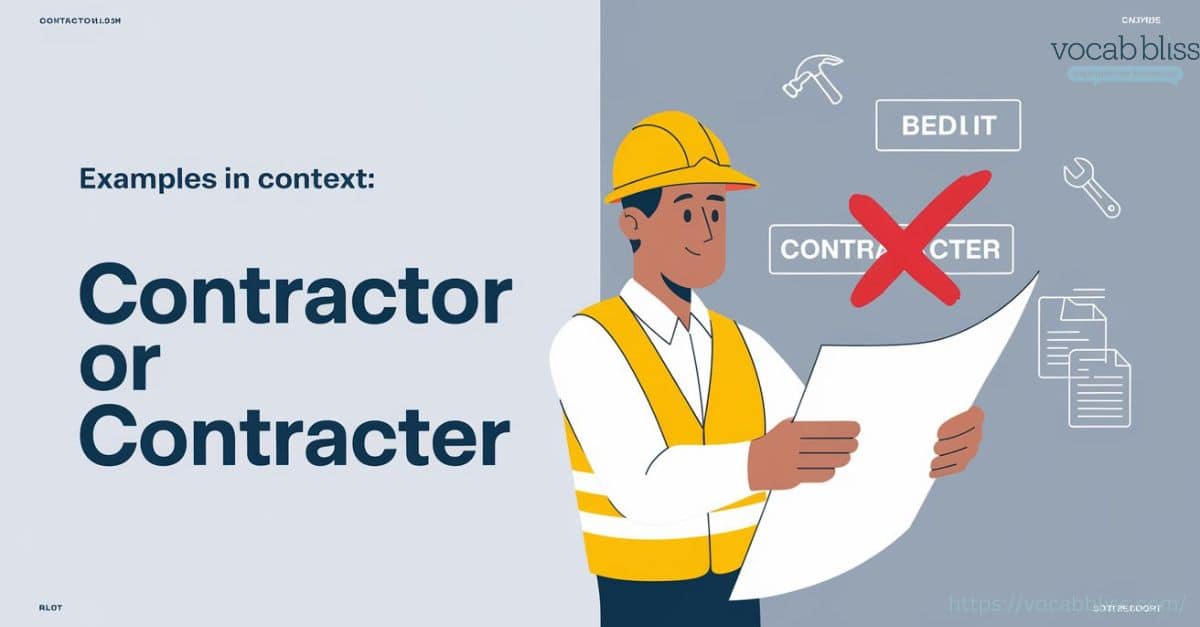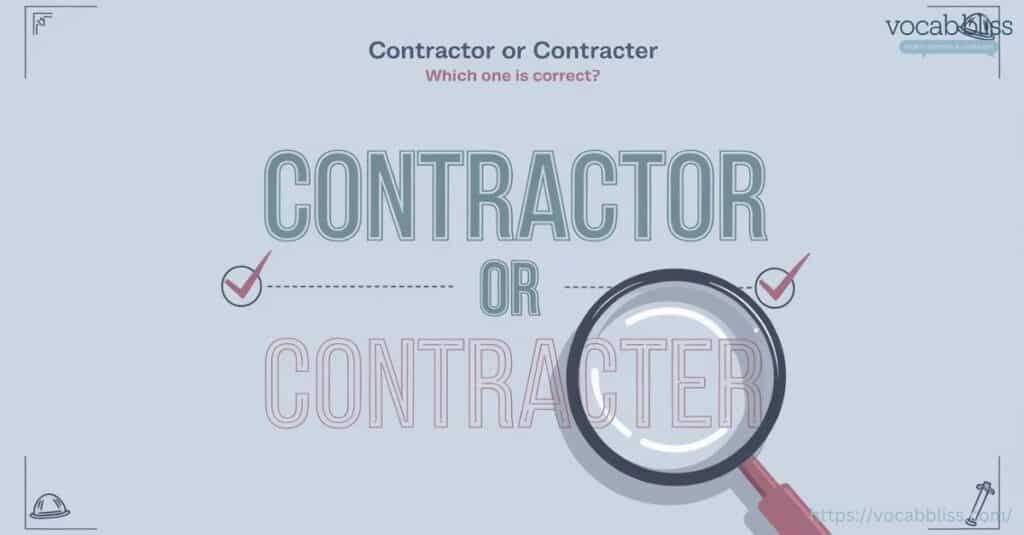The English language often stumps even the best of us with its tricky spelling and pronunciation rules. One common confusion is between contractor or contracter. If you’ve ever wondered which one is correct, you’re not alone. This article dives deep into the origins, definitions, and correct usage of these terms. Let’s settle the debate once and for all.
Quick Summary
contractor or contracter To sum up, contractor is the correct spelling for a person or business entity that enters into a contract to provide services or complete a task. Derived from the Latin word contractus, this term has been used for centuries in both legal and professional contexts. While contracter might seem like a plausible alternative, it is not recognized in formal English and should be avoided. The contractor spelling follows established English grammar rules, particularly the use of the “-or” suffix for those performing specific actions. Using the correct spelling ensures clarity, professionalism, and adherence to language standards.
Explore further: In Person or In-Person: When and Which Should You Use?
Why is There Confusion?
Common Misspellings and Typing Errors
One of the main reasons for the confusion between contractor and contracter lies in the similarity of their spelling and pronunciation. The English language has no shortage of words that follow varying patterns for endings like “-er” and “-or,” leading to uncertainty.
For example, consider words like teacher and actor. While both describe roles, one ends in “-er” and the other in “-or.” This inconsistency can make people second-guess themselves when writing unfamiliar terms. Additionally, typing errors are common, especially when quickly drafting emails, contracts, or online posts. Many people mistakenly assume both spellings are correct because the incorrect form “contracter” may not immediately appear incorrect to the untrained eye.
Examples of Misspellings:
- “The contracter submitted the proposal.”
- “We’re looking to hire a contracter for this job.”
In these cases, “contracter” is a typo or misunderstanding, often perpetuated by haste or lack of familiarity with the correct spelling.
Influence of Dialects and Pronunciation
Regional accents and variations in English pronunciation can also play a significant role in spelling confusion. For example:
- In some regions, the ending syllables of contractor might be pronounced more softly, making it sound closer to “contracter.”
- Non-native English speakers, influenced by their phonetic spelling systems, may write the word as they hear it, leading to the erroneous contracter spelling.
Similar Words Causing Confusion:
Words like inspector, inventor, and instructor all use the “-or” suffix but may still cause hesitation when compared to others like builder or writer with an “-er” ending. This inconsistency can make learners assume that either spelling— contracter or contractor —might be correct.
Contractor Meaning?

Definition of Contractor
A contractor is a person or business entity hired to perform a specific task, project, or service based on the terms of a legal agreement, or contract. According to Merriam-Webster, a contractor is “one that contracts or is party to a contract, specifically one that contracts to perform work or provide supplies.”
The term is commonly used across industries to describe professionals who work on a temporary or project-based basis rather than as full-time employees. Contractors are vital in construction, IT, creative industries, and even healthcare.
Types of Contractors
Contractors can be categorized into different types depending on the nature of their work and industry.
- Independent Contractors
Self-employed professionals who work on a per-project basis. They often manage their own schedules and are responsible for their own taxes and insurance.
Example: Freelancers like writers, graphic designers, and consultants. - General Contractors
These contractors oversee entire projects, often in construction, by managing subcontractors, schedules, and resources.
Example: A general contractor managing the building of a new home. - Subcontractors
Specialists hired by general contractors to complete specific tasks within a larger project.
Example: An electrician hired to install wiring in a new office building. - Freelance Contractors
Individuals providing specific services, particularly in fields like software development, marketing, or video production. They operate as independent professionals without long-term commitments. - Government Contractors
Companies or individuals contracted by government agencies to provide services or complete projects.
Example: A contractor hired to supply materials for public infrastructure projects.
Examples of Contractors in Context
To understand how “contractor” is used, let’s look at real-life examples:
- “The construction company hired a contractor to handle the roofing work.”
- “As a freelance contractor, she designs websites for small businesses.”
- “Government contractors often work on large-scale projects like highway construction or defense systems.”

What Does “Contracter” Mean?
Is It a Word?
No, contracter is not a word in standard English. Despite its frequent appearance in typos and informal writing, it is not recognized in any major dictionaries like Merriam-Webster, Oxford English Dictionary, or Cambridge Dictionary.
The confusion often stems from the similarity in pronunciation between contractor and the incorrect contracter, as well as English’s inconsistent rules for suffixes like “-or” and “-er.” However, in formal English, contractor is the only correct spelling.
Key Fact: The “-or” ending in contractor aligns with Latin-derived nouns that refer to a person performing an action, such as “actor” or “inventor.”
Examples of Misuse
While “contracter” might seem plausible at first glance, it is a mistake that could lead to miscommunication or an unprofessional impression. Let’s explore some common errors:
Incorrect Usage
- “The company hired a contracter to renovate the office.”
- “As a freelance contracter, she manages multiple projects at once.”
Correct Usage
- “The company hired a contractor to renovate the office.”
- “As a freelance contractor, she manages multiple projects at once.”
Why This Matters: Using the incorrect spelling, especially in professional contexts like resumes, contracts, or official emails, can undermine your credibility. To avoid such errors, remember that contractor follows the same pattern as “actor” or “director.”
Why Is Contractor the Correct Spelling?
Etymology and Historical Usage
The word contractor has its roots in Latin, originating from the term contractus, meaning “to draw together” or “to make an agreement.” This reflects the role of a contractor as someone who enters into a formal agreement to perform work or provide services.
During the transition to Middle English, contractus evolved into contractor, maintaining the Latin “-or” suffix. This suffix typically identifies someone who performs an action or fulfills a specific role, such as “actor” (one who acts) or “creator” (one who creates).
Historical Context:
- The use of “contractor” in construction and legal agreements dates back to the 1600s, particularly in formal documentation where Latin influences were strongest.
- Over time, the term became widely adopted in industries ranging from construction to government services.
Understanding its Latin origins explains why contractor, not contracter, is the historically and linguistically accurate spelling.
Grammar and Word Formation
English often uses the suffixes “-or” and “-er” to denote a person who performs an action, but their usage is influenced by the word’s etymology and linguistic history:
- “-or” Suffix
The “-or” ending is typically used for words derived from Latin. Examples include:- Actor (from actor, Latin for “doer”)
- Director (from director, Latin for “one who directs”)
- Contractor (from contractor, Latin for “one who makes a contract”)
- “-er” Suffix
The “-er” ending, on the other hand, is commonly used for words with Germanic roots or newer additions to the English language. Examples include:- Teacher
- Builder
- Writer
Why “Contractor” Aligns with Grammar
Given its Latin origin, contractor correctly uses the “-or” suffix, distinguishing it from Germanic-rooted professions like “builder.” The use of contracter not only ignores this grammatical rule but also introduces inconsistency in written communication.
Examples in Context contractor or contracter

Correct Usage of “Contractor”
Here are several examples of how to correctly use contractor in different contexts:
- Construction:
“The contractor hired a team of specialists to complete the building’s foundation.” - Freelancing:
“As a graphic designer, she works as an independent contractor, taking on projects for various clients.” - Government Projects:
“The government awarded the defense project to a reputable contractor with years of experience.” - IT Services:
“Our company has partnered with a technology contractor to upgrade the software systems.” - Event Planning:
“The event planner contracted a lighting contractor to handle the stage setup.”
These examples demonstrate how contractor fits naturally in sentences describing various industries and roles.
Incorrect Usage of “Contracter”
Using contracter instead of contractor is a common mistake, but it can come across as unprofessional. Let’s look at some incorrect examples:
- “The contracter submitted the designs late.” (Incorrect)
Correct: “The contractor submitted the designs late.” - “We hired a contracter for the renovation.” (Incorrect)
Correct: “We hired a contractor for the renovation.” - “She’s been working as a freelance contracter for years.” (Incorrect)
Correct: “She’s been working as a freelance contractor for years.”
Origins of contractor or contracter
The Latin Root Contractus
The word contractor is deeply rooted in the Latin term contractus, which means “to draw together” or “to agree.” This aligns with the essence of a contractor’s role: entering into a formal agreement to complete a specific task or provide services.
In Latin, contractus comes from the verb contrahere, which means “to pull together, assemble, or bind by agreement.” This idea of binding parties together through a legal or verbal contract forms the foundation of how contractor is used today.
The suffix “-or” also has Latin origins and is often used to denote a person who performs an action, as in:
- Actor (one who acts)
- Doctor (one who teaches or heals)
- Creator (one who creates)
Key Insight: The word contractor reflects the role of someone who brings together resources, skills, or labor to fulfill the obligations of a contract, a concept firmly tied to its Latin origins.
Early English Adaptations

The term contractor began to appear in Middle English during the 16th and 17th centuries, influenced by the legal and professional jargon of the time. As trade and construction industries flourished, so did the need for specific terminology to describe individuals or entities responsible for fulfilling agreements.
Historical Records:
- In the 1600s, contractor was frequently used in legal documents to describe individuals tasked with specific work, such as constructing buildings or supplying goods.
- By the 18th century, the term became synonymous with professionals in industries like construction, logistics, and public works.
For example, in historical contracts, phrases like “the contractor shall supply materials for the bridge’s construction” were commonplace. This usage solidified the term in both formal legal contexts and everyday language.
Legacy in Modern English
The term contractor has retained its Latin essence while evolving to fit the needs of various industries, from construction and IT to freelance work and government projects. Its enduring relevance reflects its strong linguistic foundation and practical application.
Conclusion
In conclusion, the confusion between contractor or contracter is rooted in common spelling mistakes and regional dialects. However, contractor is the correct and historically accurate spelling, grounded in its Latin roots and the consistent rules of English grammar. By understanding the origins of the word and the proper grammatical structures, it becomes clear why contractor remains the standard term.
FAQs about contractor vs contracter
- Who is called a contractor?
A contractor is anyone hired to complete a specific task under a contract. This can range from a builder constructing a house to an IT consultant managing a software rollout.
- How do you spell contractor in English?
The correct spelling is contractor, with an “-or” at the end.
- What is the difference between a contractor and a contract?
A contractor is a person or entity hired to perform tasks. A contract is the legal agreement outlining the terms of the work.
- What do you call a person who gives a contract?
Such a person is often called a client, employer, or principal, depending on the context.
- What is the definition of a contractor?
A contractor is a professional who agrees to perform services or complete a project under specific terms laid out in a contract. - How can I remember the correct spelling?
Think of other -or nouns like “actor” or “inventor.” They follow the same pattern as contractor. - Whats a Contractor?
A contractor is a person or business hired to complete specific tasks or provide services under a contract. - What Does Contractor Mean?
A contractor is someone who enters into an agreement to perform a particular task or service for a client or company. - What’s the Meaning of Contractors?
Contractors are individuals or businesses hired to perform specific tasks or provide services under a contractual agreement.
Dive Deeper:
- Allude vs Elude: How and where to Use
- Brake vs Break: The Ultimate Word Battle
- Layed or Laid: Which Is Correct?
- Is It “Free Rein or Free Reign”? Clearing the Confusion

Jorge Phillips is an experienced blogger who writes for Vocab Bliss, sharing his passion for the English language. With a knack for simplifying complex grammar rules and a focus on commonly confused words, Jorge helps readers navigate the nuances of English with ease. His insights aim to make learning engaging and practical.







